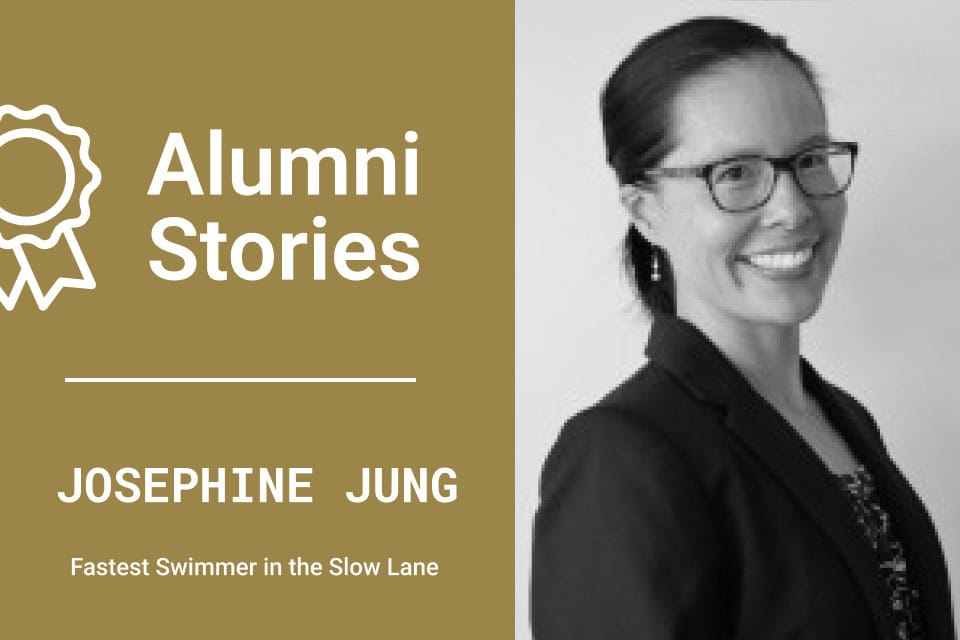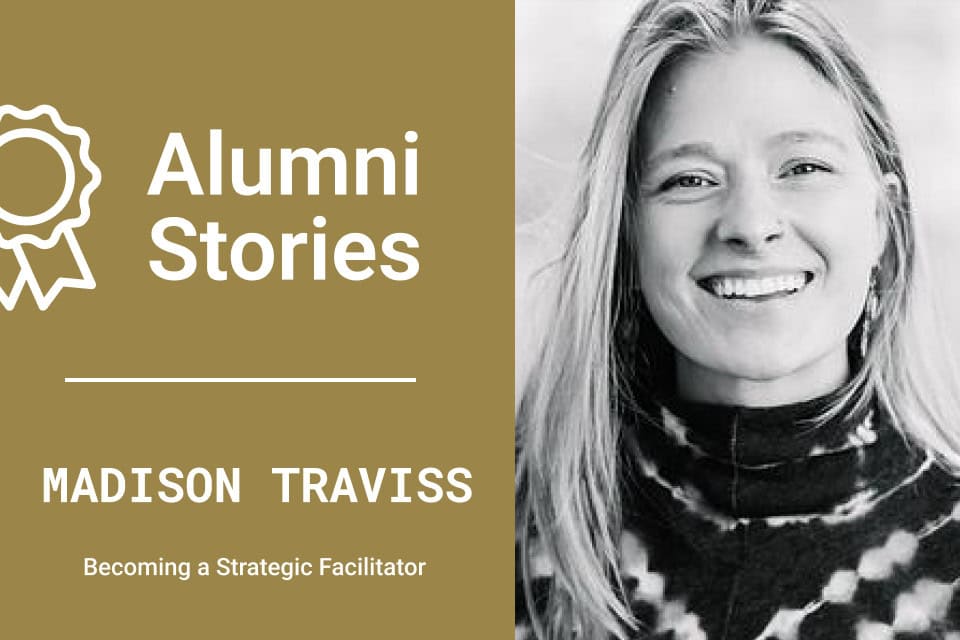An Alumni Story by Dom Michalec
Six years ago, I found myself at a pivotal crossroads in my career. I had just completed four incredible years working in two startups, donning multiple hats and absorbing invaluable lessons along the way. During those years, I was part of incredibly collaborative teams that tackled intriguing challenges in an effort to revolutionize stagnant industries.
I’ll never forget the time when one of our products was knocked offline and a handful of us volunteered to drive all over the Midwest to get the product back up and running. We met early in the morning on a Wednesday, quickly huddled, and set out on our mission. We were all back in the office by Friday for our all-staff meeting. We moved quickly, collaborated effectively, and had each other’s backs the entire time.
And when we weren’t rolling up our sleeves to get things done, we tackled big questions.
Everything from how do we help people get the medications they so desperately need? to how might we help people know when their power will be restored after heavy storms?
Amidst this whirlwind of innovation, a lingering question always seemed to find itself in the backdrop of our work: “Are we crazy to think we can possibly change an entire industry?”
While that question was daunting, figuring out how to align rapidly growing teams to the challenges behind the question added to the complexity. Conflict was always a part of the equation.
Inspired by my experience with these teams, I made the decision to try my hand at consulting. Fueled by curiosity, I had a new, yet similar question for myself to consider: am I crazy to think I can possibly change how teams at large companies work to be more like those startup teams?

I cared deeply to find an answer, but in the back of my mind I knew I needed new skills to align teams if I wanted a shot at “no” being the final answer.
My journey as a consultant has led me through a gauntlet of exciting trials and tribulations, helping me accumulate invaluable wisdom, scar tissue, experiences, and revelations along the way.
The most significant of these revelations emerged around the time I began my certification journey with Voltage Control in 2022.
Upon entering the program, it became abundantly clear that even the most talented teams made up of incredible individual contributors require healthy friction to unleash their full potential. Answering crazy questions usually necessitates it.
That part wasn’t that revolutionary.
How that helpful friction is handled to promote growth, however, was.
Reflecting back on that Midwest product roadshow, it was clear: our team actually had a ton of conflict when it came to solving our offline product problem. We stormed a lot. But somehow that mission brought us all closer together. We grew because of that experience.
And looking back at my time in both startups and consulting, I failed to recognize the crucial role facilitation plays in fostering growth behaviors in a team. I was of the mind that simply delivering content in the form of training was enough to get teams to act differently, treat each other differently, and product results differently.
As I embarked on my journey alongside a group of talented individuals in the VC Certified Facilitator program, I noticed we were evolving into a cohesive team, committed to honing our facilitation crafts together. But it wasn’t without healthy conflict expertly facilitated by Erik.
The experience reminded me of my days working in startup land. Everyone in the program rolled up their sleeves and tackled big questions together. And we did it with a heavy dose of both group harmony and healthy conflict.
While it’s easy to think we could’ve done it all organically, it’s clear we achieved this cohesion because of the intentional facilitation we experienced along the way throughout the experience.
No one was trying to change anyone. No one made it their responsibility to induce transformation as they saw fit. Instead, we were all there to create an experience to unleash new possibilities in each other, together. Challenging each other was table stakes and easy to lean into because Erik showed us how to create favorable conditions.
Upon finishing the program, it struck me: I’d been asking the wrong question for nearly 6 years.
The question was no longer am I crazy to think I can possibly change how teams at large companies work to be more like those startup teams?
The question was now what’s possible for these teams at large companies with someone there to facilitate harmony and healthy conflict along the way?
The number one thing I learned about myself throughout the VC program was my need to lean into the discomforts of handling conflict in a team environment. Different teams have different dynamics, yet each dynamic yields opportunities for either healthy or unhealthy conflict to emerge. What’s possible is only answered by addressing how to use conflict to move into a new way of working and growth as a team.
Erik helped me see this during our 1:1 sessions together. As I was putting together my program portfolio, it was clear that an area of growth for me was to explore the idea of creating warmth and opportunities for a team to test their trust in one another. I really appreciated his partnership and still reflect on his notes to this day.
“The number one thing I learned about myself throughout the VC program was my need to lean into the discomforts of handling conflict in a team environment.”
The program helped me understand that, as a consultant, I don’t need all the answers. And I don’t need to make it my sole mission to change anyone. I can, however, facilitate the change people already want to see by leveraging the collective wisdom of the people I work with day in and day out. Creating the conditions for healthy conflict to create something novel is a big part of that.

The facilitation certification journey with Voltage Control made me realize that. I was shown a better question to ask from a healthier stance bolstered by a career-enabling skill. Keying in on both my strengths and areas of growth helped unlock that for me.
“The program helped me understand that, as a consultant, I don’t need all the answers.”
Now, as a certified facilitator, my approach has shifted dramatically. In every workshop I facilitate, I ensure there’s space to address healthy conflict. In every meeting, I ensure we debrief to see where there’s alignment and where perspectives differ. In every group coaching activity, I find ways to help people challenge each other to spur growth and new perspectives.
Conflict is the catalyst for growth. Not me. I’m there to simply facilitate its involvement in the process.
My purpose and approach are both clearer thanks to this experience. I now aim to facilitate groundbreaking discoveries by channeling collective insights and intelligence to achieve outcomes. And, most importantly, I am now guided by a more meaningful question to pursue alongside the teams I serve. And I have Voltage Control to thank for that.


